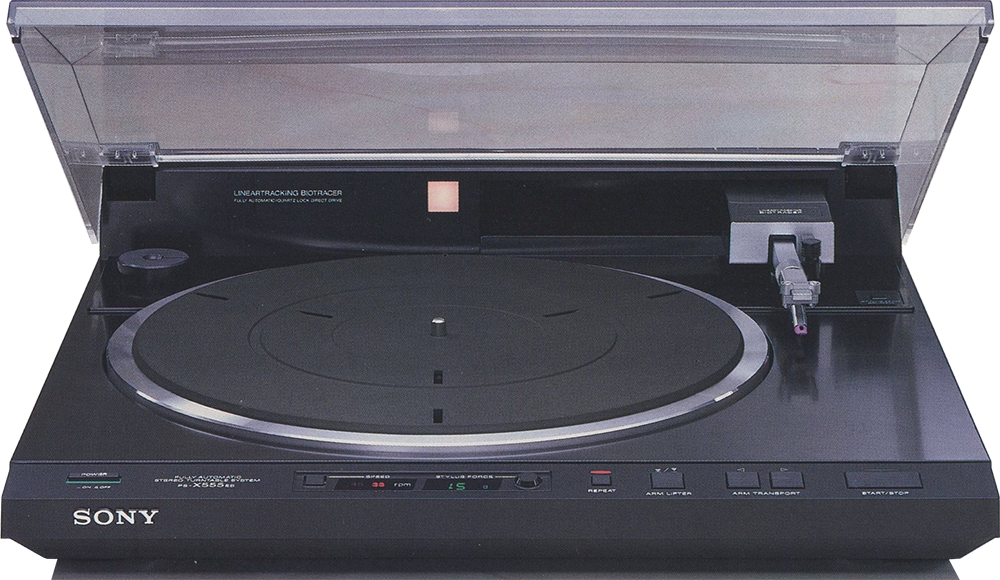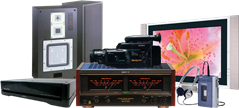
PS-X555ES
Linear tracking tonearm
A linear tracking tonearm is designed to duplicate the movement of the head which cuts the record master.
Compared with a pivoted tonearm, a linear tracking arm has a very small tracking error (which means greatly reduced harmonic distortion) and almost no pressure on the inside wall of the groove (which means improved tracking ability and channel separation).
Biotracer electronic tonearm
The horizontal and vertical movement of the tonearm is monitored by the Biotracer’s own sensors, and this information is transmitted to the tonearm by the tonearm’s own linear motors to suppress resonance at low frequencies and to obtain the maximum signal-to-noise ratio. With the microcomputer incorporated, the tonearm movement, up/down or forward/backward, is accurate and smooth.
Front panel operation with the dust cover closed
The ARM TRANSPORT buttons allow you to move the tonearm easily over the desired point of the record with the dust cover closed. Start/stop of the record play and tonearm up/down can also be controlled using the buttons on the front panel.
Electronic stylus force adjustment
As the stylus force is adjusted by the control on the front panel and digitally read out, it can be easily adjusted even during record play.
Automatic record size selection
The record size is automatically set by a photo sensor system. If no record is on the turntable, the tonearm will not descend but will automatically return to the arm rest.
Muting system
A muting system activates when the tonearm is lifted and is deactivated after the tonearm lowers onto a record so there is no need to turn the amplifier volume down every time a stylus is placed on a record.
Quartz lock and magnedisc servo system
The turntable maintains an accurate and drift-free speed by referring to a frequency generated by a very stable quartz oscillator, and with aid of a speed monitoring system which utilizes a magnetic pick-up head and a pulse signal derived from a magnetic coating at the edge of the platter.
Linear torque BSL motor
Direct drive system with Sony’s unique BSL (brushless and slotless) motor which has an extremely low noise level and whose smoothness virtually eliminates wow and flutter. Its high torque assures a quick Start to 33 1/3 rpm after only a half revolution.
Synchronized operation with the Sony cassette decks
When the tonearm lowers onto the lead-in groove of a record, the cassette deck stand-by mode is released and the record mode assumed. When play finishes, the cassette deck is automatically set first in the record muting mode, then in the pause mode. This synchronized operation is possible with Sony cassette decks equipped with a four-pin remote control jack which is connected with the Sony RM-65 synchro remote control unit.
| MODEL | Sony PS-X555ES |
| Introduction Year | 1983 |
| Mechanical | |
| Number of heads | 2 |
| Heads | LA |
| Auto Reverse | • |
| Closed Loop Dual Capstan | - |
| Direct Drive | - |
| Quartz Lock control | - |
| Power Loading Open/Close | - |
| Specifications | |
| Wow & Flutter WRMS | 0,04% |
| Frequency response ±3dB / Dolby Off | |
| - type I / Normal | 30 - 16.000 Hz |
| - type II / CrO2 | 30 - 17.000 Hz |
| - type III / FeCr | 30 - 17.000 Hz |
| - type IV / Metal | 30 - 17.000 Hz |
| Dolby Noise Reduction | B/C |
| Signal-to-noise ratio (Metal) | |
| - Dolby Off | 59 dB |
| - Dolby B | 66 dB |
| - Dolby C | 72 dB |
| - Dolby S | - |
| Total harmonic distortion | 1,0% |
| Bias Frequency | 105 kHz |
| Dolby HX-Pro | - |
| Features | |
| AMS Music Search | • |
| Cue & Review | • |
| Blank Skip | • |
| Music Scan | • |
| Blank Search | - |
| High Speed Dubbing | - |
| Relay Play | - |
| Relay Record | - |
| Twin Record | - |
| Variable Bias | - |
| Record Level Calibration | - |
| Calibration Tone | - |
| Auto Cal / BLE | - |
| VU meters | 2 x 16 segments FL |
| MPX-filter | - |
| Tape Selection | automatic |
| - type of tapes | I/II//III/IV |
| Counter | • |
| - real time | • |
| Counter Memory | • |
| Timer Rec/Play | • |
| Auto Play | • |
| Rec Mute | • |
| Repeat Function | - |
| Microphone Input | • |
| Headphone Output | • |
| Remote Control Sensor | - |
| Remote Control included | - |
| Power consumption | 27 Watts |
| Dimensions wxhxd mm | 430 x 105 x 275 |
| Weight | 6,2 kg |
| • = present | - = not present | u/k = unknown | Typing errors and errors taken from sources reserved. No rights can be derived from this overview. | |


Comments